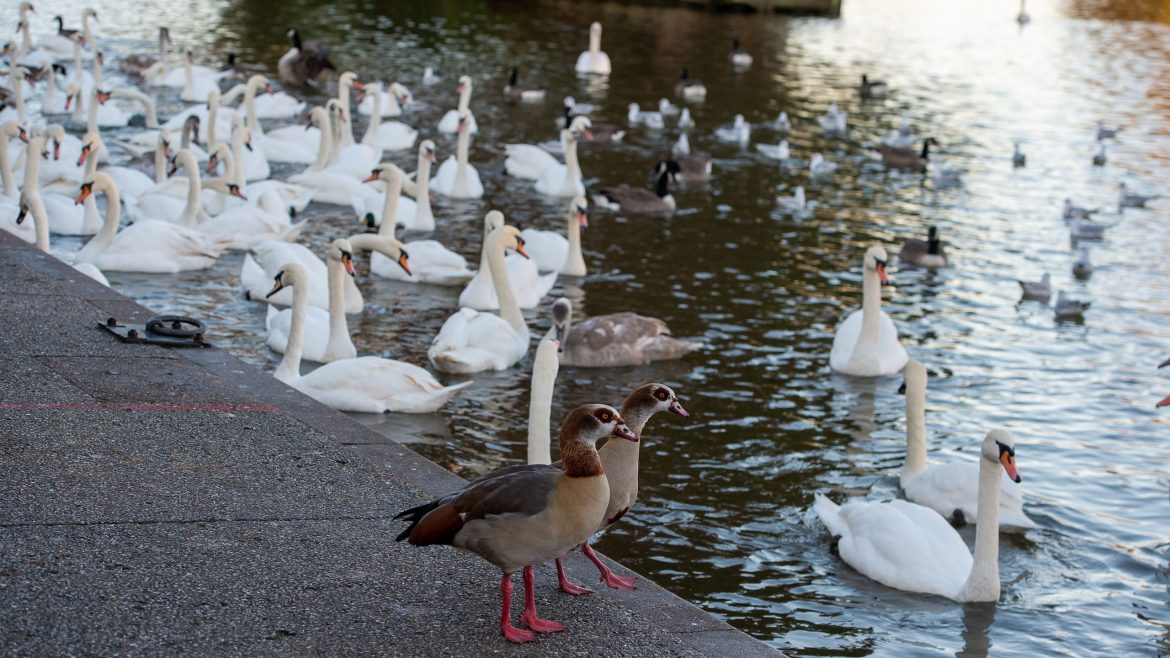Richmond Park has asked the public not to feed or touch wildlife after numerous avian flu outbreaks across Britain.
In late October, testing confirmed a highly pathogenic strain of avian influenza (HPAI H5N1) present in birds at a rescue centre near Droitwich Spa in Worcestershire. This strain has since been confirmed at 23 other premises across Britain.
An Avian Influenza Prevention Zone (AIPZ) has been declared across the UK to prevent further spread of the disease.
Royal Parks are carrying out “enhanced monitoring”
The Royal Parks – the organisation which manages Richmond Park – said it is carrying out “enhanced monitoring” to check for signs of illness in birds, and to ensure that any dead birds are removed immediately. To date, there have been no outbreaks of the disease at any of the parks, and they have not observed the disease in captive birds or wild birds that frequent the rivers and lakes.
The public are asked to assist their efforts by not feeding or touching wildlife, and reporting any sick or dead birds seen in the Royal Parks to 0300 061 2000 or via email: hq@royalparks.org.uk.
What is bird flu?
Avian Influenza – also known as bird flu – is a disease affecting chickens, ducks, geese, gamebirds, other captive birds and many species of wild birds. This infectious type of influenza is highly contagious, and can be spread between birds by direct contact, bird droppings or contaminated environment.
The disease occurs in different strains, each described by ‘H’ and ‘N’ number. Some forms are highly pathogenic, causing higher mortality in birds, as well as lower pathogenic forms which can spread but do often not cause mortality in birds.
Can it affect humans?
In rare cases, the disease can affect humans – there are four strains which cause concern (H5N1; H7N9; H5N6 and H5N8). They do not infect humans easily and are not usually spread from human to human, but several people have been infected around the world, leading to a number of deaths.
To prevent bird flu, the NHS advises that people:
- Wash hands before and after handling food, in particular raw poultry
- Use different utensils for cooked and raw meat
- Make sure meat has been cooked thoroughly
- Avoid contact with live birds and poultry.
What not to do
- Do not go near or touch sick or dead birds or bird droppings
- Do not go to live animal markets or poultry farms
- Do not bring back live birds, including feathers, to the UK from abroad
- Do not eat raw eggs
- Do not eat undercooked poultry or duck.
According to the NHS, the main symptoms appear quickly and include:
- A very high temperature, or feeling hot or shivery
- Headache
- Aching muscles
- A cough or shortness of breath.
What are the signs a bird has bird flu?
Highly pathogenic strains can cause the following symptoms in birds:
- Swollen heads
- Blue colouration of the comb and wattles
- Lack of appetite
- Respiratory distress
- Diarrhoea
- Significant decrease in egg production.
Outbreaks continue to rise
The table below shows the current cases across England. There have also been two cases identified at premises near Wrexham and the Isle of Anglesey in Wales, and one case in the Angus constituency of Scotland.
| Outbreak | Location | Date confirmed |
| 1 | Wychavon, Worcestershire | October 26 |
| 2 | Bidford, Warwickshire | November 7 |
| 3 | Tendring, Essex | November 11 |
| 4 | Salwick, Fylde, Lancashire | November 12 |
| 5 | Leeming Bar, Hambleton, North Yorkshire | November 13 |
| 6 | Kirkham, Fylde, Lancashire | November 16 |
| 7 | South Derbyshire, Derbyshire | November 17 |
| 8 | Bournemouth, Christchurch and Poole | November 19 |
| 9 | Copeland, Cumbria | November 19 |
| 10 | Cheshire West and Chester, Cheshire | November 20 |
| 11 | Maldon, Essex | November 21 |
| 12 | Wells-next-the-sea, Norfolk | November 21 |
| 13 | Thirsk, Hambleton, North Yorkshire | November 21 |
| 14 | Second premise near Thirsk, Hambleton, North Yorkshire | November 22 |
| 15 | Second premise near Leeming Bar, Hambleton, North Yorkshire | November 22 |
| 16 | Charnwood, Leicestershire | November 25 |
| 17 | Third premise near Thirsk, Hambleton, North Yorkshire | November 25 |
| 18 | Poulton le Flyde, Wyre, Lancashire. | November 25 |
| 19 | Clitheroe, Ribble Valley, Lancashire. | November 26 |
| 20 | Fourth premise near Thirsk, Hambleton, North Yorkshire | November 26 |
| 21 | Fifth premise near Thirsk, Hambleton, North Yorkshire | November 28 |
Zones have been put in place around contaminated premises to help control the spread of the disease, however, disease arriving from wild birds is hard to predict and prevent.
You can report suspected or confirmed cases in England by calling the Defra Rural Services Helpline on 03000 200 301.





